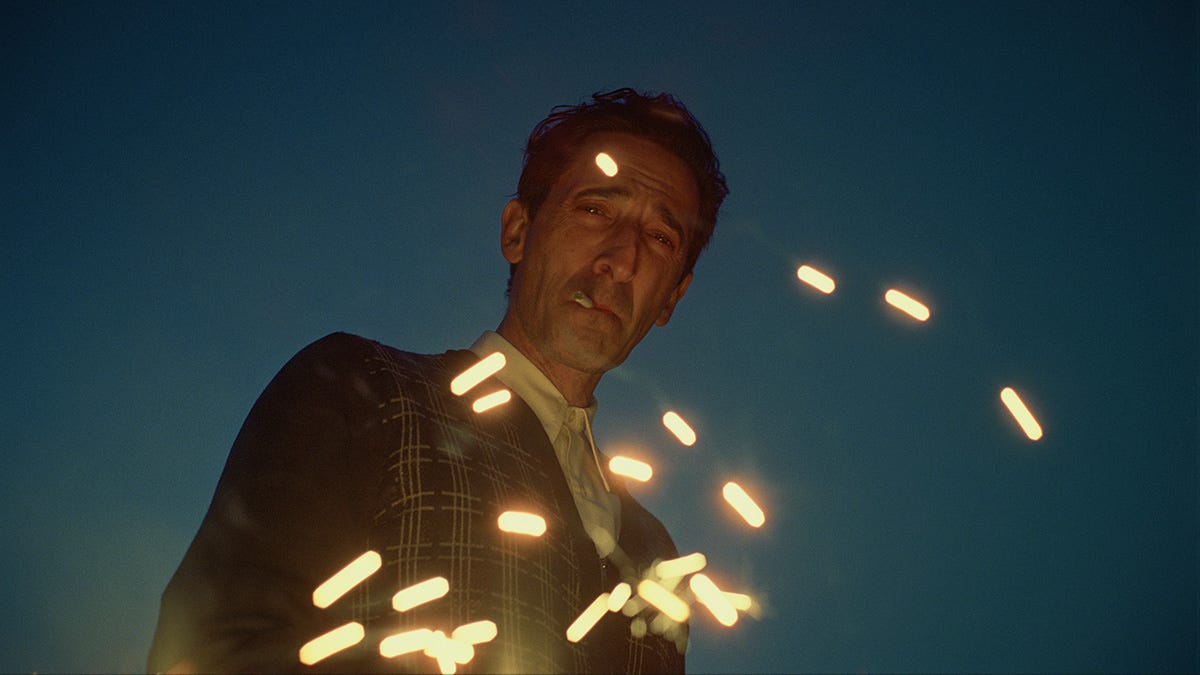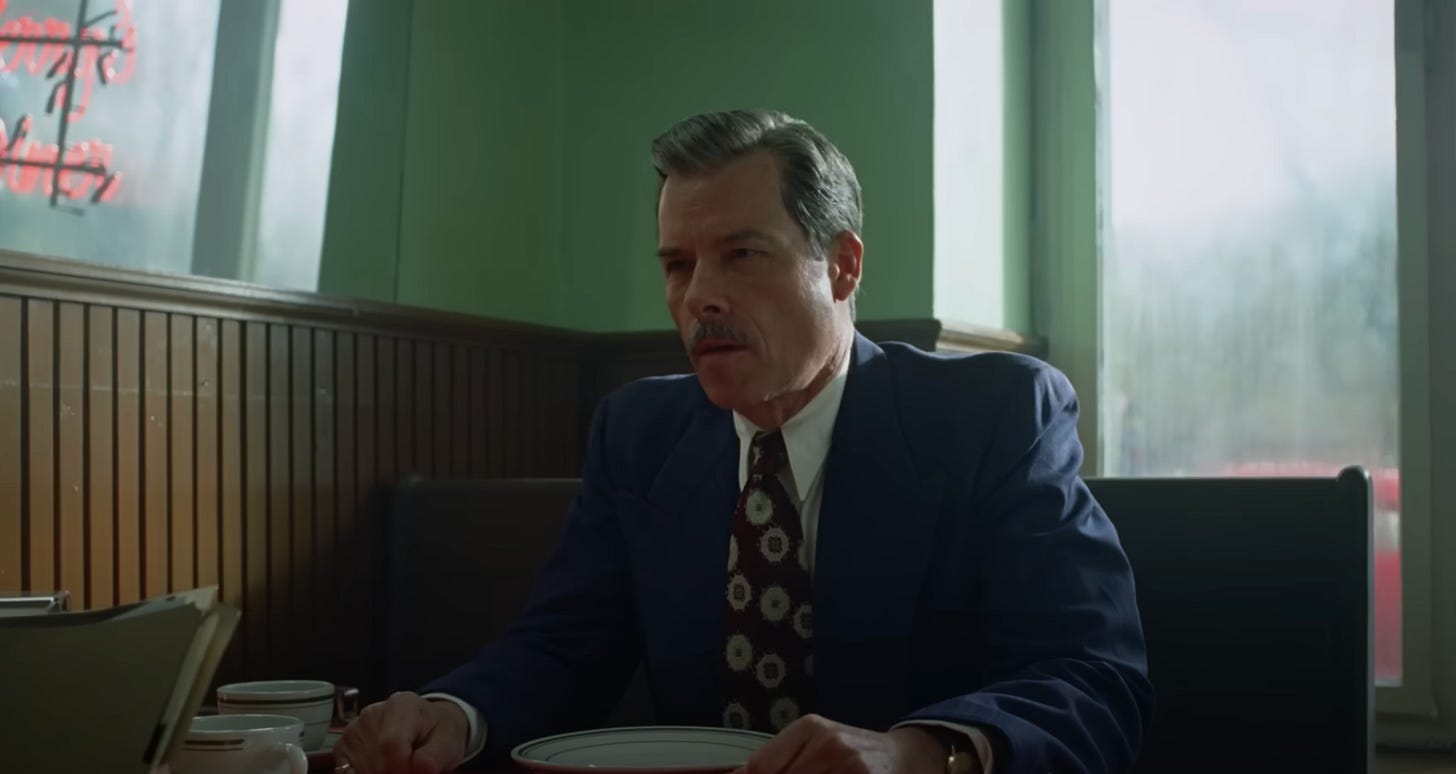It was announced earlier this week that The Brutalist managed to bag seven Golden Globe nominations, with almost certainty that the film will replicate the same presence at the Oscars. The three-and-a-half-hour epic gained a lot of attention and critical acclaim with some surprised that it lost out on the Golden Lion at the Venice Film Festival to Pedro Almodóvar’s The Room Next Door. However, Brady Corbet was awarded the Silver Lion for best director to compensate for the loss.
After the highly impressive Vox Lux which followed a pop star’s troubled journey into fame following a school shooting, high anticipation grew for Corbet’s next film. With this work, he’s caught the attention and approval of critics, even those who found themselves divided by their verdicts on Vox Lux. But is it the best film of the year as many have already claimed, and can it grab a Best Picture award? Although the work is impressive, I suspect not.
The Brutalist begins with a robust start. We listen to a monologue discussing freedom, diving into possibly the best scene in cinema that captures an immigrant arriving in America as the camera floats below the Statue of Liberty in an upside-down shot. The American dream is bigger than life itself. The opening title’s graphics are exceptionally stylish. This is a carefully considered work visually. This introduction to The Brutalist delivered serious promise. However, it’s not long after that the foot gets taken off the gas pedal and we’re thrust into the first act, where immersion is stalled and our minds begin to wander, much like Lol Crawley’s camera, but unable to capture anything of significance that redemands our attention.
Adrien Brody is László Tóth, a promising architect who flees to the States from post-war Europe in 1947 to rebuild his life. As he works to jump-start his career, a wealthy client named Harrison Lee Van Buren Sr. (Guy Pearce) gives László a shot at achieving success in America as an architect. László’s tale only begins to get interesting once he develops a closer relationship with Harrison, however by that point you’re nearly halfway through the slog of its running time. Thankfully, Corbett inserts a fifteen-minute timed intermission to ease the viewing experience. But it also acts as a divider to prepare you for the true talent The Brutalist has to offer in its stimulating latter half.
Once László’s architecture job for Harrison is well underway, his disabled wife Erzsébet (Felicity Jones) arrives in the States with his niece Zsófia. The pair’s reunion was long-awaited, however, the troubles of their relationship are laid bare during their first night together in their new homeland. Erzsébet asks László if he still wishes to be with her, to which he responds “Stop this nonsense”. He avoids answering her directly. Erzsébet then attempts to pleasure her husband through masturbation as she delivers an immersive monologue, much like the one we experienced at the beginning of this journey. László cries whilst being pleasured, he can’t bear it.
The Brutalist becomes progressively more twisted as László is exposed to the evil nature of the Lee family. Especially Harrison’s son, Harry (Joe Alwyn) who makes clear that László’s presence is tolerated rather than appreciated. We started our journey with too much optimism to care deeply about these characters. Only when dirty games are being played among them are we fully transported into the world. Screenwriters Mona Fastvold and Corbet then take us down a very dark path as they deliver what may be the most linguistically startling rape scenes in cinema history. It’s during The Brutalist’s darkest moments when the dialogue between the characters really pops out, becoming the star of the show along with Lol Crawley’s cinematography that alerts you to mastery of the cinematic craft.
As The Brutalist is brought to its conclusion, you come to appreciate that the destination you arrive at was worth the slog you endure during the first half of its epic journey. Quite appropriately, the final message of László’s tale is “It is the destination, not the journey.” This statement provokes many considerations such as whether a certain amount of suffering is required to reach your desired destination, and how much are we willing to suffer? If pain is inevitable from chasing after ambition, which individuals are worth suffering for?
While these considerations may be stimulating on a personal level, should one discard a film's flaws if their satisfaction is delivered upon destination? It depends on the individual work, but with the intellectual ecstasy felt after watching The Brutalist, I’m tempted to say yes. However, whether the Academy is willing to give such leeway for such a strenuous viewing experience seems unlikely. While The Brutalist rewards the viewer in multiple ways, for a film to finally deliver the goods an hour and a half into the viewing experience is a test of whether consumers that lie outside of the cinephile bracket of movie-goers have the patience to see this one out. In recent years the Academy appears to have rewarded its top prize to works that display a balanced satisfaction between the cinephile and the occasional observer. The Brutalist doesn’t quite hit that mark.
Is this Corbet’s masterpiece? While it may be his most ambitious and successful work, Vox Lux remains a near-perfect contemporary tale that doesn’t suffer from the challenges of longevity and offers the intellectual stimulation that marks him as one of the most interesting filmmakers of the twenty-first century. The Brutalist can only do good things in ensuring we receive more contributions from an art house filmmaker who has the benefit of securing access to Hollywood.
Out in UK cinemas 24th January 2025





